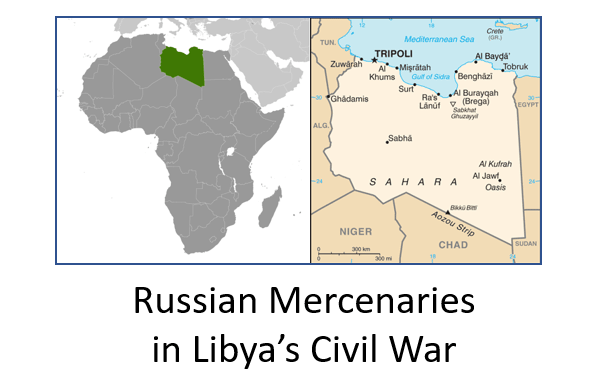
The civil war in Libya continues to grind away and foreign nations are supporting one faction or another in the conflict. Russia is one of those countries – providing aircraft, vehicles, technicians, air defense equipment, and mercenaries to the fight.
The civil war began after the fall of Moammar Gadhafi from power. He was the long-time dictator of Libya before a NATO-backed revolt removed him from power in 2011. Since then the country has been in turmoil and currently there are two factions fighting for control of Libya.
The Wagner Group, a Russian private military company (PMC), has been on the front lines of the Libyan conflict since late 2018. Russia is supporting the Libyan National Army (LNA) led by a Libyan warlord – Field Marshal Khalifa Hifter. The LNA is positioned in the east of the country. It maintains control of the east and some of the central and south regions of Libya. In addition to Russia, the LNA is supported by the United Arab Emirates and Egypt.
Hifter is a former Central Intelligence Agency asset. He was exiled during Gadhafi’s rule and lived in the U.S. He became a U.S. citizen and lived in Virginia for many years. In 2011 he returned to Libya.

The Government of National Accord (GNA) is internationally recognized by most of the world’s governments and is backed by the United Nations. The United States (diplomatically) is also backing the GNA as well. The GNA is based in the west, headquartered in the capital of Tripoli. A key battleground is the area around Sirte where oil refineries and shipping ports are located. Other countries actively supporting the GNA include Turkey and Qatar.
The Wagner Group is believed to be headed by a former Russian intelligence officer – Yevgeniy Prigozhin. He has close ties to Russian President Vladimir Putin. The Wagner Group has been active in many troubled spots in the world to include Syria, Ukraine, Crimea, Central African Republic, and other nations. The group’s personnel are known to train alongside Russian armed forces and are suspected to work closely with the Russian military intelligence agency (the Main Intelligence Directorate, or GRU).
The Wagner Group is reported to have been founded by Dmitry Utkin – a former member of a special forces unit of the GRU. Utkin’s call sign was Wagner – and thus the name Wagner Group.
Recent imagery released by U.S. Africa Command (AFRICOM) shows Wagner forces and equipment deployed in Libya.

Russia has provided a variety of military equipment to include fighter aircraft (Mig-29s and Su-24s), air defense systems (SA-22s), armored vehicles, and weapons. Some equipment is known to be flown into Libya on Russian military cargo aircraft like the Ilyushin IL-76s.
In May 2020 AFRICOM reported that approximately 14 fighter aircraft were flown from Russia to Iran and then on to Syria where their Russian markings were painted over. The aircraft then departed Russia’s Khmeimim airbase in western Syria and were flown into Libya to the Al-Jufra airbase controlled by General Khalifa Haftar.
For the last few years the Wagner Group has operated out of at least two bases in eastern Libya – in Benghazi and Tobruk. Wagner personnel are actively involved in the fighting on the front lines. They are assisting in delivering accurate mortar and artillery fire by serving as forward fires observers. In addition, LNA artillery fire has been enhanced with laser-guided munitions. Russian snipers have been reported to be targeted mid-level GNA commanders. Russian technicians have been repairing vehicles and providing expertise for air defense systems and drones.
It has been estimated that as many as 2,000 Wagner Group personnel were operating in Libya in late 2019. In addition, some 2,000 Syrians are in Libya – possibly working for the Wagner Group.
The Russian Federation is violating United Nations Security Council Resolution UNSCR 1970 by providing military personnel and equipment to the Libyan conflict.
Russia is attempting to gain a foothold in Libya so it will have a presence on the southern edge of the Mediterranean Sea. It is likely looking at the possibility of future air and naval bases in Libya should its side win out in the civil war. Establishing military bases in Libya would provide Russia with increased influence in Africa and the Mediterranean as well as a military presence on NATO’s southern flank. Once Libya is stabilized it will likely resume the export of significant quantities of oil – which could be another long-term benefit for Russia.
**********
Image: Derived from maps produced by the Central Intelligence Agency (CIA).
References:
“The GRU, Yevgeny Prigozhin, and Russia’s Wagner Group: Malign Russian Actors and Possible U.S. Responses”, Kimberly Marten, testimony before U.S. House of Representatives, July 7, 2020, 13 pages, PDF.
“Who’s Flying Those MiG-29s in Libya and Why Does It Matter?”, Forbes.com, June 29, 2020.
“Wagner Group in Libya: Weapon of War or Geopolitical Tool?”, by Sergey Sukhankin, Terrorism Monitor, The Jamestown Foundation, June 26, 2020.
“Implausible Deniability: Russia’s Private Military Companies”, by Paul Stronski, Carnegie Endowment for International Peace, June 2, 2020.
“Hundreds more Russian mercenaries flee western Libya: GNA forces”, Aljazeera.com, May 25, 2020.
“Wagner, shadowy Russian military group, ‘fighting in Libya'”, BBC News, May 7, 2020.
“SOF in Libya – Providing Direct Support”, SOF News, August 9, 2016.
“Wagner Group”, Wikipedia.
https://en.wikipedia.org/wiki/Wagner_Group